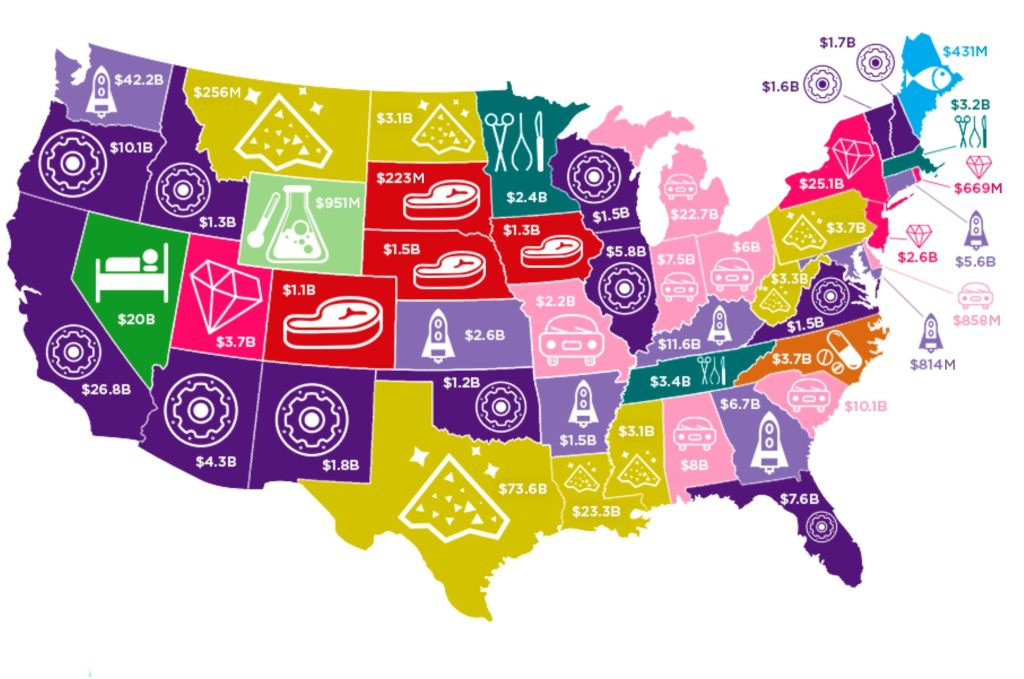
The largest US industries play a critical role in shaping the national economy, providing jobs, and driving innovation. As one of the world’s largest and most diversified economies, the US relies on key industries to maintain its global economic leadership. From technology and healthcare to finance and manufacturing, these sectors not only generate substantial revenue but also influence international markets. Understanding the largest US industries can provide insight into how economic trends impact both domestic and global business.
The technology industry is one of the largest US industries, contributing significantly to the country’s GDP. Silicon Valley has long been the epicenter of innovation, with major companies like Apple, Microsoft, and Google leading the charge. These tech giants create cutting-edge products and drive advancements in artificial intelligence, cloud computing, and digital transformation. The ongoing shift toward automation and the adoption of new technologies continue to boost growth, making this sector one of the most dynamic in the US.
Healthcare: A Growing Powerhouse
Healthcare is another one of the largest US industries, consistently expanding as the population grows and ages. The healthcare sector encompasses hospitals, pharmaceuticals, medical devices, and insurance, making it a complex and far-reaching industry. As the demand for healthcare services rises, especially with the aging baby boomer generation, the sector remains a vital component of the US economy. Additionally, recent innovations in telemedicine, biotechnology, and personalized medicine have accelerated growth within this industry.
The COVID-19 pandemic significantly impacted the healthcare industry, driving the need for advanced medical research, vaccines, and treatments. This has led to increased funding for pharmaceutical companies and medical research institutions, further solidifying healthcare’s status as a major contributor to the US economy. As healthcare spending continues to rise, the industry is expected to remain one of the largest and fastest-growing sectors.
Manufacturing: A Backbone of the Economy
Manufacturing has been a cornerstone of the US economy and remains one of its largest industries today. Despite challenges like outsourcing and automation, it still plays a critical role in producing goods for domestic and global markets. The automotive, aerospace, and electronics sectors, particularly, are key drivers of US manufacturing. Companies like Ford, Boeing, and General Electric have established global reputations for innovation and quality, maintaining the country’s manufacturing leadership.
In recent years, technological advancements have transformed the industry, with automation, robotics, and the Internet of Things (IoT) revolutionizing production processes. These technologies have allowed manufacturers to boost efficiency, cut costs, and improve productivity. Despite globalization’s challenges, the manufacturing sector remains a vital contributor to the US economy, supporting millions of jobs and powering other industries.
Finance: Powering Economic Stability
The finance industry ranks among the largest US industries, acting as the backbone of the country’s economic stability. Major financial hubs like New York City house some of the world’s largest institutions, including JPMorgan Chase, Goldman Sachs, and Citibank. The finance industry spans banking, investment management, insurance, and real estate, making it a diverse and essential sector of the US economy.
As global markets evolve, the finance industry facilitates trade, investment, and economic growth. Technological advancements, such as blockchain and fintech, have revolutionized financial services, improving efficiency and accessibility for both consumers and businesses. The rise of digital banking and online payment platforms has further fueled growth in the finance industry. The sector remains critical for maintaining economic stability and supporting global trade.
Retail: A Major Contributor to Consumer Spending
The retail industry ranks among the largest US industries, largely driven by consumer spending, which forms a major part of the US GDP. Retailers, from online platforms like Amazon to physical stores like Walmart and Target, constantly evolve to meet consumer needs. The rise of e-commerce has revolutionized the industry, with more consumers opting to shop online than ever before.
This shift has intensified competition among retailers, pushing them to offer faster delivery, personalized experiences, and competitive pricing. Despite challenges such as evolving consumer behaviors and supply chain issues, the retail industry continues to thrive. Retailers increasingly use technology to enhance customer experiences, leveraging data analytics to personalize marketing and streamline operations.
The growth of e-commerce, combined with the enduring strength of traditional retail, ensures the retail industry remains a crucial part of the US economy.
Energy: Powering the Nation
The energy industry ranks among the largest US industries, supplying essential resources for homes, businesses, and transportation. Fossil fuels, including oil and natural gas, dominate the market, but renewable energy sources like wind, solar, and hydropower are gaining momentum. The US is transitioning toward cleaner energy alternatives, driving growth in renewable energy.
Key players in the US energy sector include ExxonMobil, Chevron, and NextEra Energy, contributing to both traditional and renewable markets. The US is also a leading global producer of oil and natural gas, which bolsters its economic stability. As concerns over climate change increase, the industry is experiencing significant investment in renewable technologies. This shift presents new opportunities for innovation and economic growth, as the US seeks to balance energy demands with sustainability goals.
Technology, healthcare, manufacturing, finance, retail, and energy remain the largest US industries, driving economic growth, innovation, and job creation. Each sector shapes the country’s economy and contributes to global competitiveness. Understanding these industries helps businesses identify trends, make informed decisions, and explore expansion opportunities.

